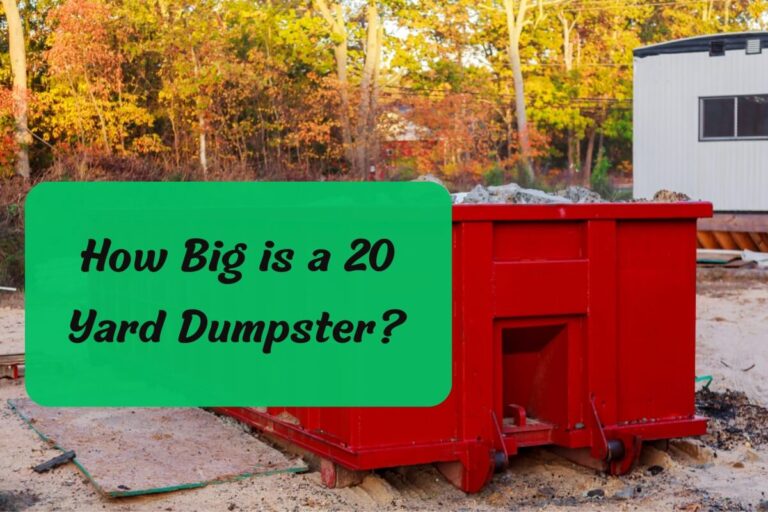Renovations, construction projects, and major cleanup jobs often require renting a large, sturdy dumpster to handle heavy debris and waste disposal. One of the most popular roll-off dumpster sizes is the 30-yard container, offering ample volume for medium to large-scale jobs. But how much does it cost to rent a 30-yard dumpster?
The average cost to rent a 30-yard dumpster in the U.S. ranges from $360 to $809, with the nationwide average around $562.42 for a 7-day rental period. However, rental rates vary significantly based on location, debris type, duration, weight limits, and potential extra fees.
This in-depth guide will cover all the key factors influencing 30-yard dumpster rental pricing in 2024. We’ll explain what a 30-yard dumpster is, outline common uses, detail the rental process, and provide money-saving tips to help you budget accurately for your project’s waste disposal needs.
What is a 30 Yard Dumpster?
A 30-yard dumpster is a large roll-off trash container frequently used for construction, demolition, renovation, and major cleanup projects that generate significant volumes of debris and waste materials. These dumpsters are rectangular with an open top and a hinged door on one end for easy walk-in loading.
The standard dimensions for a 30-yard dumpster are approximately:
- Length: 22 feet
- Width: 7.5 feet
- Height: 6 feet
While dimensions can vary slightly between manufacturers, a 30-yard roll-off dumpster always has a total volume capacity of 30 cubic yards.
To visualize the capacity, a 30 cubic yard dumpster can typically hold:
- 170-190 large contractor trash bags
- The equivalent of 9 full pickup truckloads
- Enough demolition waste to fill a 10ft x 12ft room, 8 feet high
The large volume and open-top design make 30-yard dumpsters versatile for handling solid waste materials like construction and demolition debris, household junk, yard waste, roofing shingles, and more.
Average Cost to Rent a 30 Yard Dumpster
Renting a 30 yard roll-off dumpster will likely cost between $360 on the low end to over $809 in some major metropolitan areas. However, the actual price can fluctuate based on several key factors:
Location
Where you rent the dumpster from will impact pricing due to differences in operational costs and market rates across various regions of the United States. For example, the average 30 yard dumpster rental cost in Texas cities like Houston and Dallas is around $588-$608, while in New York City it’s typically $899-$985.
Rental Period
Most dumpster rental periods last 7-10 days. Extending the rental timeframe will incur additional daily or weekly charges. Returning the dumpster earlier may qualify for a prorated discount in some cases.
Debris Type
The type of waste materials you’ll be disposing of can affect pricing. Heavy, dense materials like dirt, concrete, or roofing shingles may have a different rate than lighter construction debris or household junk. Some companies also charge higher rates for hazardous or regulated waste streams.
Weight Limit
30 yard dumpsters generally have a 3.5-5 ton (7,000-10,000 lbs) weight allowance included in the base rental price. Exceeding this limit will result in overage fees, typically $40-$100 per extra ton depending on your location.
Overage Fees
In addition to overweight charges, you may incur fees for keeping the dumpster longer than contracted, disposing of prohibited items, causing a site delay during pickup, or putting the dumpster in a difficult location.
With rental prices spanning a broad range, it’s wise to get multiple quotes from local dumpster rental companies tailored to your specific job details. This ensures you get an accurate estimate and understand all potential fees upfront.
How to Choose the Right Dumpster Size
Selecting the proper dumpster size is crucial to avoid overpaying for excess capacity you don’t need or underestimating your waste volume which leads to overage fees.
The 30 yard dumpster hits the sweet spot for many medium to large-scale projects, but you’ll want to consider the weight and bulk of your debris when choosing between dumpster sizes.
As a general guide, a 30 yard dumpster is ideal for:
- Home renovations or additions
- Basement, garage, or estate cleanouts
- Construction of a small house or building
- Roofing debris up to 6,000 sq.ft.
- Mixed construction and demolition debris
- Yard waste like trees, stumps, dirt (limited weights)
If your debris will consist primarily of dense, heavy materials like concrete, roofing shingles, or soil, you may want a smaller 10 or 20 yard dumpster instead. These have lower weight capacities to avoid excessive overage charges.
For kitchen remodels, single-room renovations, or other jobs with lighter, bulkier debris streams, a 30 yard container offers plenty of volume. But for bigger whole-home cleanouts and construction projects, a larger 40 yard dumpster rental may be more cost-effective.
Most dumpster rental providers can help assess your project scope and recommend the ideal container size when you call for quotes. It’s always better to overestimate your needs slightly rather than undersize your dumpster.
Best Uses for 30 Yard Dumpsters
While versatile for all sorts of renovation and construction debris, 30 yard roll-off dumpsters are particularly well-suited for certain types of projects:
Home Additions and Remodels
Home additions generate a mix of construction waste like lumber, drywall, roofing, siding, and more. A 30 yard dumpster gives ample room for materials from adding a room, finishing a basement, or renovating a kitchen or bathroom.
Whole-Home Cleanouts
When preparing to move, homeowners often need to dispose of years’ worth of accumulated belongings. A 30 cubic yard container allows you to easily toss in furniture, appliances, electronics, and boxes of household goods during a whole-house purge.
Construction and Demolition
Building a new home or tearing down part of an existing structure creates significant refuse. The 30 yard size is perfect for demolishing an attached garage, small outbuilding, loads of mixed construction waste, and site prep debris.
Roof Replacements
Reroofing projects require removing existing shingles, underlayment, and more before installing new roofing. For most single-layer residential roofs under 6,000 sq.ft., a 30 yard dumpster can handle the tear-off waste.
Clearing Lots and Yards
Having major landscaping or tree work done? A 30 yard dumpster rental allows you to efficiently clear away yard waste like branches, stumps, dirt, and green waste in one solid haul.
Of course, for any projects dealing with heavier concentrated loads like pure concrete, soil, or masonry, a smaller dumpster size may be more cost-effective. And extremely large cleanouts, whole-home demolition, or major commercial jobs may require the added capacity of a 40 yard container.
Rental Process for a 30 Yard Dumpster
Renting a 30 yard roll-off dumpster is a straightforward process, but there are a few key steps to ensure a smooth experience:
- Get Quotes and Choose a Provider Contact 2-3 local dumpster rental companies, explain your project scope, debris types, and get a firm quote with pricing details. Compare pricing and any potential fees to get your best value.
- Prepare the Drop-off Location Have a flat, easily accessible spot for dumpster delivery – either your driveway, street frontage, or a designated area on the job site. Make sure there is at least 22-24 feet of unobstructed space to accommodate the container’s length.
- Schedule Delivery and Permit if Needed Once you select a rental provider, confirm your desired delivery date/time window. In some areas, you may need to obtain a permit from the municipality to have the dumpster temporarily placed on the street.
- Load the Dumpster Properly When it’s time to start filling the dumpster, focus on evenly distributing weight and taking advantage of the full capacity. Be mindful of any prohibited items like hazardous materials.
- Schedule Pickup or Swap Most rental periods last 7-10 days, but this can vary by company and location. If you need additional time, you can typically extend the rental period for a daily or weekly fee.
Once you’ve filled the dumpster or no longer require it on-site, schedule a pickup time with your rental provider. For larger jobs, you may opt to have the full dumpster swapped out for an empty one if you still have more debris to dispose of.
- Prepare for Dumpster Removal On the scheduled pickup day, ensure the dumpster is properly loaded (nothing sticking up over the top edges) and clear any obstacles from the pickup area. The driver will need around 60 feet of straight access to retrieve the dumpster.
- Consider Recycling or Donating Before filling your dumpster, see if any materials can be recycled, donated, or repurposed instead of thrown away. This can reduce your disposal tonnage, which saves money and is better for the environment.
Tips to Save Money on 30 Yard Dumpster Rentals
While convenient, renting a roll-off dumpster can put a dent in your project budget if you’re not careful. Follow these tips to help maximize your rental and keep costs in check:
Shop Around for Prices
Dumpster rental rates can vary significantly between local providers. Get at least 3-4 quotes and compare pricing details to find the best deal. Fees for weight overages, rental periods, and disposal can add up quickly.
Maximize Your Weight Allowance
Know the included weight limit and distribute debris evenly to use all available capacity without exceeding it. Consider a dumpster with a higher weight allowance if you’ll be disposing of dense materials.
Only Rent for As Long As Needed
While it’s tempting to book a longer rental period for convenience, this can get expensive with extended charges. Only reserve the dumpster for as long as your project truly requires.
Donate/Recycle When Possible
Items like appliances, electronics, yard waste, and some construction materials are often accepted for recycling or donation if still in usable condition. This reduces your disposal volume.
Check for Permit Requirements
Depending on your local ordinances, you may need to obtain a street permit to have the dumpster placed on the road for delivery and pickup. Factor this cost into your budget if required.
Ask About Discounts
Some dumpster rental companies offer discounts for longer rental periods, off-peak/off-season rates, or other promotions you may qualify for. It never hurts to inquire about any available discounts.
With some savvy preparation and budgeting, it’s possible to get all the benefits of a 30 yard dumpster rental while keeping costs reasonable. The key is understanding all potential fees, planning efficient use of the dumpster, and simply avoiding unnecessary rental time or charges.
Following these tips and guidance, you can rent the appropriate 30 yard roll-off dumpster for your project needs while keeping disposal costs under control. Whether renovating a home, tackling a construction job, or cleaning out a property, a properly-sized dumpster makes quick work of hauling away waste and debris.

